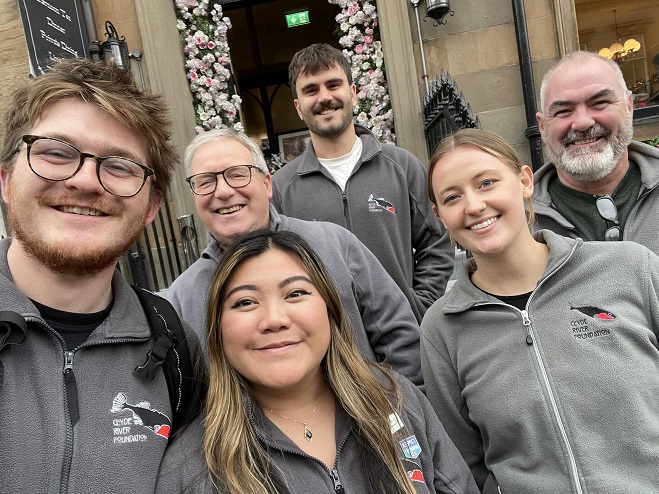Clyde in the Classroom celebrates 25 years of inspiring ecology
Published: 15 January 2025
They have transformed 2,000 classrooms into fish hatcheries and inspired 50,000 children to learn about the importance of local biodiversity. Now, Clyde in the Classroom – the unique, hands-on freshwater biology project that seeks to bring the River Clyde into classrooms around the West of Scotland – is proudly celebrating its 25th anniversary
They have transformed 2,000 classrooms into fish hatcheries and inspired 50,000 children to learn about the importance of local biodiversity. Now, Clyde in the Classroom – the unique, hands-on freshwater biology project that seeks to bring the River Clyde into classrooms around the West of Scotland – is proudly celebrating its 25th anniversary.
The Clyde in the Classroom project, which is led by the Clyde River Foundation based at the University of Glasgow’s School of Biodiversity, One Health & Veterinary Medicine, aims to inspire children to become “future stewards of the river” while learning about the ecology and wildlife in their local area. The project also has a strong focus on issues of sustainability, including the causes and impacts of pollution and other threats on our precious freshwaters.

Over the last 25 years the project has been so successful at inspiring young minds, that some former Clyde in the Classroom pupils have continued their passion for the natural world and gone on to study zoology, creating a full circle moment for the project team who now see them during their studies the University of Glasgow.
The Clyde River Foundation was founded in 1999 to improve the understanding of river and fisheries management in the River Clyde system. In 2001 the Foundation began the Clyde in the Classroom project, which has grown from just five participating schools every year to around 100 schools and 3,000 children annually.
A key part of the project sees brown trout egg hatcheries brought into all participating schools, with pupils and teachers taught how to maintain water quality and look after the fish as they hatch and grow. After several weeks of classroom visits – putting working scientists in front of potential scientists - the Clyde River Foundation team help the children release their young fish to their local river.
The innovative project is aimed at pupils in schools around the River Clyde catchment, taking in eight local authority areas, including Glasgow and as far afield as Inverclyde, Renfrewshire and South Lanarkshire. This year, Clyde in the Classroom will reach almost 3,000 pupils from 112 classes in 94 schools from the eight local authorities around the River Clyde system.
The project will launch between the 8 and the 16 January 2025 at the Glasgow Science Centre, as hundreds of children descend on the venue over the course of five days to learn about the ecology and history of the River Clyde, and how to care for their hatcheries. Glasgow Science Centre has been a partner in the project since its inception.
Dr Willie Yeomans, Clyde River Foundation Catchment Manager, said: “Education projects have been part of our core work for 25 years. The purpose of Clyde in the Classroom and our other initiatives is to encourage people to consider the ecology of the river in their everyday lives. We are delighted that the scale and reach of the project is showing long-term impact; we frequently have teachers involved that participated as children, and now our ‘Future Stewards’ are specialising in Marine and Freshwater Biology at Glasgow University.”
Glasgow Science Centre’s Chief Executive Officer Stephen Breslin said: “At Glasgow Science Centre, we believe that everyone should have the opportunity to engage with science and explore the world around them and are proud to have hosted and supported Clyde in the Classroom for the past 25 years.
“As an educational charity, with a Clyde-side campus, we know just how important initiatives like these are in teaching the next generation about freshwater biodiversity, sustainability and ecology.
“We look forward to welcoming more pupils to the Science Centre this year to learn how to look after our rivers.”
This year, as for the last decade, the main sponsor of the Clyde in the Classroom project will be Crown Estate Scotland, with additional financial support from the Heritage Concern Foundation, the Hugh Fraser Foundation, the Blackwood Estate Community Association, the River Kelvin Angling Improvement Association, the Lamington & District Angling Improvement Association, the Bridge of Weir (River) Angling Club and the United Clyde Angling Protective Association Limited.
The eight council areas the project takes in are Glasgow, North Lanarkshire, South Lanarkshire, West Dunbartonshire, East Dunbartonshire, Renfrewshire, East Renfrewshire and Inverclyde.
Oster Milambo, Director of Property at Crown Estate Scotland, said: "Crown Estate Scotland exists to generate lasting value for Scotland. We believe supporting successive generations of young people to learn about the ecology of the Clyde River catchment, grow into its future custodians and help to preserve it for future generations is a natural fit with our core purpose.
We also manage the rights to fish for Salmon and similar fish across the Clyde River catchment - and we see a clear linkage between the education this programme delivers and the responsible practices necessary to keep angling a healthy and viable pursuit in the future.
These strong connections have made it easy for Crown Estate Scotland to support Clyde in the Classroom over many years and we are proud to continue supporting the programme today in its 25th year."
Planetary Health research at the University of Glasgow is focused on studying the state of Earth’s natural systems, and our impact on them. Our researchers analyse human disruptions to Earth’s environment, alongside addressing their impacts on both human health and planetary life.
Enquiries: ali.howard@glasgow.ac.uk or elizabeth.mcmeekin@glasgow.ac.uk
First published: 15 January 2025
<< MVLS News

